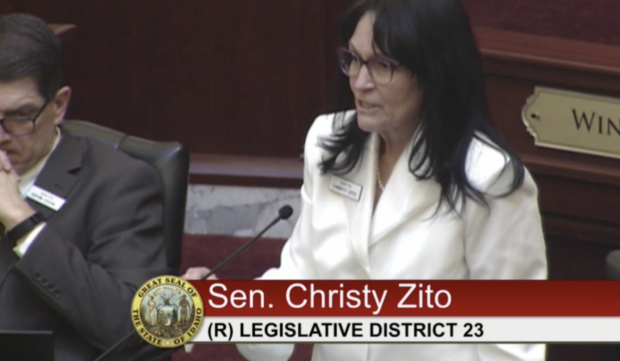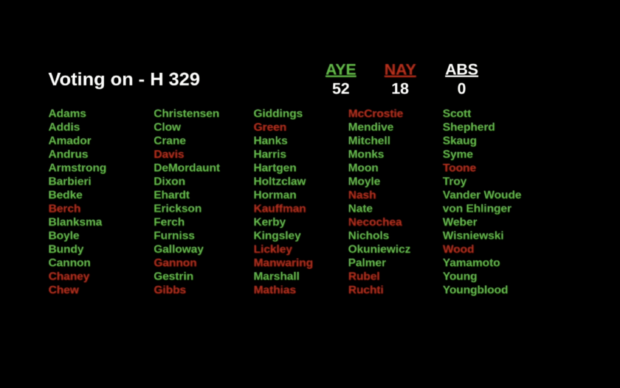The Strong Students grants bill died a second death on the Senate floor Wednesday morning.
Senators rejected an attempt to bring House Bill 294 back for another vote.

On Tuesday, a deeply divided Senate voted down HB 294 — a proposal to use federal stimulus dollars and state funding to create an education grant program for low-income households. Parents could have received grants of up to $750, to pay for educational supplies, tutoring or other student needs.
Parents would have also been allowed to put grant dollars toward private school tuition and fees, a recurring talking point during Tuesday’s Senate debate. Echoing several education groups — who labeled the private school tuition and fees language a roundabout school voucher program — opponents said HB 294 bore little resemblance to the federally funded Strong Families, Strong Students grant program Gov. Brad Little launched last fall.
By contrast, Wednesday’s floor debate was brief and perfunctory.
Sen. Christy Zito, R-Hammett, used a parliamentary procedure to urge the Senate to reconsider Tuesday’s vote to kill HB 294. Lawmakers on the prevailing side of a vote — in this case, the side opposing HB 294 — can ask for reconsideration.
Zito voted against HB 294 Tuesday. On Wednesday, she said she had rethought her opposition to using federal dollars for the grant program.
“I’ve received a lot more information on this,” Zito said.
In the end, Wednesday’s vote wasn’t as close as Tuesday’s vote.
The motion to reconsider failed on a 15-20 vote.
On Tuesday, the Senate rejected HB 294 on a razor-thin 16-18 vote.
Had Zito voted yes on Tuesday, that would have changed the roll call to 17-17 — leaving Republican Lt. Gov. Janice McGeachin to break the tie.
House OKs school club regulations
The House passed House Bill 329, which would add new rules for how school clubs and organizations become sanctioned and take on members.
The bill would require that school boards approve the creation of new clubs and that parents and guardians sign off on their children joining. It passed on nearly a party-line vote.

Rep. Barbara Ehardt, R-Idaho Falls, the bill’s sponsor, again called the proposal a “parental rights bill” Wednesday. She first said it would shield schools from liability if students in unsanctioned clubs are endangered — in a car wreck while traveling with the club, for example. But Ehardt’s testimony focused on the bill’s potential to allow school boards to block the creation of “activist clubs.”
She railed against a “Planned Parenthood club” that she claims existed in an Idaho high school at one point, and voiced fears that politically progressive clubs such as a student organization associated with Black Lives Matter could crop up without school board approval.
“Other clubs that have arisen in Idaho are human rights clubs. Again, these are activist clubs,” Ehardt said.
Some fellow Republicans joined in suggesting national organizations would become affiliated with Idaho school groups.
Rep. Heather Scott, R-Blanchard, suggested a pedophilia advocacy group could, through a mechanism she did not detail, create a club in a middle school without the new regulation.
“There is the North American Man/Boy Love Association,” said Scott, glancing at her laptop. “And right now, that could pop up at your school, and your 10-year-old boy could be recruited, and there’d be no accountability.”
Critics argued the proposal would put stress on school boards, force students in foster care to jump through hoops to join clubs and fail to control the activities and discussions some fear students are partaking in.
Rep. Steve Berch, D-Boise, argued the bill would create “a bureaucratic nightmare” for school districts and fail to regulate student groups.
“Clubs are popping up without school knowledge. This bill doesn’t solve that problem … This bill does not prevent students … getting together to talk about whatever it is they want to talk about,” Berch said.
HB 329 will now head to the Senate.
House starts working on K-12 budgets
After a restive debate — and an overwhelming vote to reject a higher education budget, the House spent a few minutes Wednesday afternoon starting their work on K-12 budgets.
With no debate, and with matching 70-0 votes, the House passed two of the seven K-12 budget bills. The first would put $26.2 million of taxpayer money into school facilities — including bond levy equalization and a charter school building fund. The second would provide about $11.6 million in taxpayer money for the Idaho School for the Deaf and the Blind.
These two budget bills go to the Senate.
The House still needs to vote on the balance of a $2 billion K-12 budget plan, including bills covering teacher and administrative salaries.
JFAC stamps out $4K request to eliminate ‘social justice activism’
As the Joint Finance-Appropriations Committee reconsidered McGeachin’s office budget Wednesday morning, two lawmakers asked that $4,000 be added to her budget, to rid critical race theory and social justice activism from K-12 schools.
Rep. Priscilla Giddings, R-White Bird, asked that the money be diverted to McGeachin to fund a task force to “identify these misuses of funds in K-12.”
“Look at these potential problems with promoting social justice activism and critical race theory in our schools,” Giddings said. “$4,000 is a very modest amount to properly fund this new task force.”
Rep. Ron Nate, R-Rexburg, supported Giddings’ motion, which failed on a 2-17 vote.
“I think it’s a great idea to have a task force like this — some fresh set of eyes to look from outside the education establishment to see the problems going on in higher education. It would be a good move to take a look at K-12 and just make sure that our public dollars are being spent constitutionally, and on programs and education that reinforces American and Idaho values,” Nate said.
Senator Janie Ward-Engelking, D-Boise, a career classroom teacher, said the money was unnecessary.
“Having worked in the K-12 arena for over 30 years, I can tell you that there is no money being used at this point to promote social justice activism in the way that the representatives have described in the past,” Ward-Engelking said. “What teachers do is, they present both sides of all arguments and listen to children and try to allow them to have a voice, to determine what their values are.”
McGeachin’s budget was reconsidered after JFAC cut a long-vacant position from her office earlier this year, to the dismay of Nate and McGeachin, Betsy Russell’s Eye on Boise blog reported. A new version of her budget, restoring funding for a part-time position, got the nod Wednesday morning.
Senate passes Ybarra’s open schools bill
Working into the evening Tuesday, the Senate approved state superintendent Sherri Ybarra’s bill urging schools to remain open during an emergency.
Under House Bill 175, school districts and charter schools would be expected to offer in-person instruction “to the greatest extent possible.”
The Senate passed HB 175 on a 35-0 vote. The bill has already passed the House, and now goes to Gov. Brad Little’s desk.
Idaho Education News covered these legislative hearings remotely.
